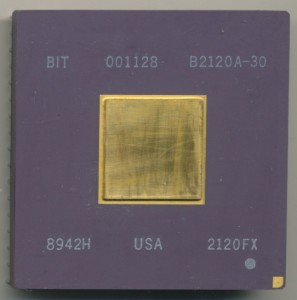ALU of the Day: Bipolar B2120A-30
Bipolar Integrated Technology Inc. (BIT) was founded in 1983 in Beaverton Oregon by former Floating Point Systems, Intel, and Tektronix engineers. Their goal was to develop fast floating point processors based on a bipolar process (rather then the more common NMOS and CMOS of the time. The bipolar process is used to make TTL, and ECL type products, and had been used in several previous processors, including the AMD 2901 and the SMS300 (Signetics 8X300).
The B2120 was part of a complete floating point chip set that was released in 1987. the B2120 handled all the ALU functions, while the B2110 was the multiplier. It was designed by Bob Elkind who was one of the original employees of BIT and oversaw the development, layout, and packaging of most of their early products. The B2120 was a TTL compatible device while the B3120 and B3110 made using ECL 10KH instead. Both were made using Bipolar’s proprietary P111 1.2 micron process. The B2120A-30 had a typical cycle time of 30ns, giving it an effective clock rate of 33MHz.
In 1990 BIT introduced the B2130 (TTL) B3130 (ECL 10KH) and B4130 (ECL 100k) which were 100MHz single chip versions of the 2110/2120
BIT would later make a SPARC chipset called the B5000 (which at 80MHz was the fastest processor of its time) and a follow on version called the B6000. Both were made using ECL. Reliability problems and the eventual catchin up of CMOS in speed led to their demise, and in 1996 BIT was purchased by PMC-Sierra (who ended up consolidating a lot of 80’s and 90’s companies).


